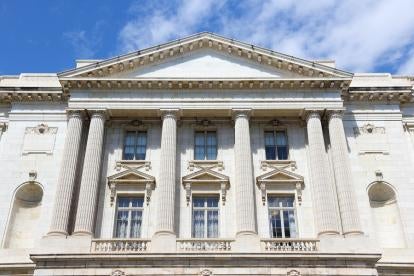Legislative Activity
CHOICE Act 2.0 Could Be Weeks Away as GOP May Need to Resolve Differences
While previous reports indicated that House Financial Services Committee Chairman Jeb Hensarling (R-TX) was set to move on a revised version of the Financial CHOICE Act (CHOICE Act 2.0), his plan seems to have been met with delay. Though the text of the revised bill has not been introduced, it appears that the revised bill will, among other things: (1) eliminate the CAMELS requirement from the capital election; (2) exempt banking organizations that make the capital election from stress tests; (3) make targeted “improvements” to stress tests and CCAR; (4) restructure the CFPB as a civil law enforcement agency with additional restrictions on its authority; (5) make numerous SEC-related reforms to improve capital markets; (6) impose additional requirements on financial regulators to hold them accountable, including by designating a “Lead Banking Investigator”; and (7) expand the JOBS Act to improve the atmosphere for small businesses and encourage capital formation. The bill will also likely include a technical corrections section to conform the current legislation with Dodd-Frank.
Despite a general agreement among Republicans that financial services regulatory reform is needed, the division within the party may prove problematic when trying to pass broad reform legislation. Take Orderly Liquidation Authority (OLA) provided for in the Dodd-Frank Wall Street Reform and Consumer Protection Act (Dodd-Frank), for example. The OLA created a new federal receivership process whereby the Federal Deposit Insurance Corporation (FDIC) serves as receiver for large, interconnected financial companies whose failure poses a significant risk to the financial stability of the United States. In its place, the CHOICE Act, as introduced last year, would add a new Subchapter V to Chapter 11 of the Bankruptcy Code – also known as new Chapter 14 – to facilitate reorganizations for large financial companies. Some Republican constituencies, however, oppose plans to repeal OLA. Other examples of potential points of contention, including repeal of the Durbin Amendment and the authority of the Financial Stability Oversight Council (FSOC) to designate certain payments and clearing organizations as systemically important “financial market utilities”.
This Week’s Hearings:
-
On Tuesday, February 28, the House Financial Services Committee has scheduled a markup of the Committee’s FY18 Budget Views and Estimates.
Regulatory Activity
FSOC to Hold First Meet Under Mnuchin’s Leadership
On Thursday, March 2, Treasury Secretary Steven Mnuchin will preside over his first executive session of the FSOC. The preliminary agenda includes: (1) an update on market developments; (2) a discussion of FSOC’s 2017 annual report; and (3) an update on the annual re-evaluation of the designation of a nonbank financial company.
Fiduciary Rule Delay Still Pending at OMB
Less than two weeks after President Trump’s February 3 Executive Memorandum calling on the Department of Labor (DOL) to conduct a legal and economic review of the Fiduciary Rule’s potential impact, DOL has submitted a notice to the Office of Management and Budget (OMB) that it plans to delay the rule’s effective date for 180 days. Note, however, the 180 day delay is not effective until published in the Federal Register. As of the time of publication, no such announcement has been published. As finalized last year, the rule was set to take effect on April 10, 2017.
Note, DOL’s decision follows a February 17 ruling by a Kansas federal judge who sided with DOL by finding that the Department did not exceed its authority in promulgating the Fiduciary Rule.
Next SEC Chairman May Seek to Scale Back Certain Regulations
Following his nomination by President Trump to be the next Chairman of the Securities and Exchange Commission (SEC), Mr. Jay Clayton has expressed concern that many of the SEC’s rules have become too burdensome for small companies trying to raise capital and that repeal of certain regulations may be necessary. SEC Acting Chairman Michael Piwowar has already frozen agency action on unfinished Dodd-Frank rules and called for a review of the CEO Pay Ratio Rule. Note that a confirmation hearing for Mr. Clayton before the Senate Banking Committee has not yet been scheduled.
D.C. Circuit Panel Shakes Up Fannie and Freddie
Last week, a D.C. Circuit panel rejected allegations that an amendment to the 2008 bailout of Fannie and Freddie improperly swept up profits from Fannie Mae and Freddie Mac to the Treasury, affirming a lower court’s ruling that actions taken under the Federal Housing Finance Agency’s (FHFA) conservatorship of Fannie and Freddie cannot be challenged in court. . Separately, Treasury Secretary Steven Mnuchin has said the Trump Administration would move quickly to end government-control of the companies, although neither Secretary Mnuchin nor President Trump have specified their plans for reform.
Patrick Kirby is co-author of this article.



 i
i


